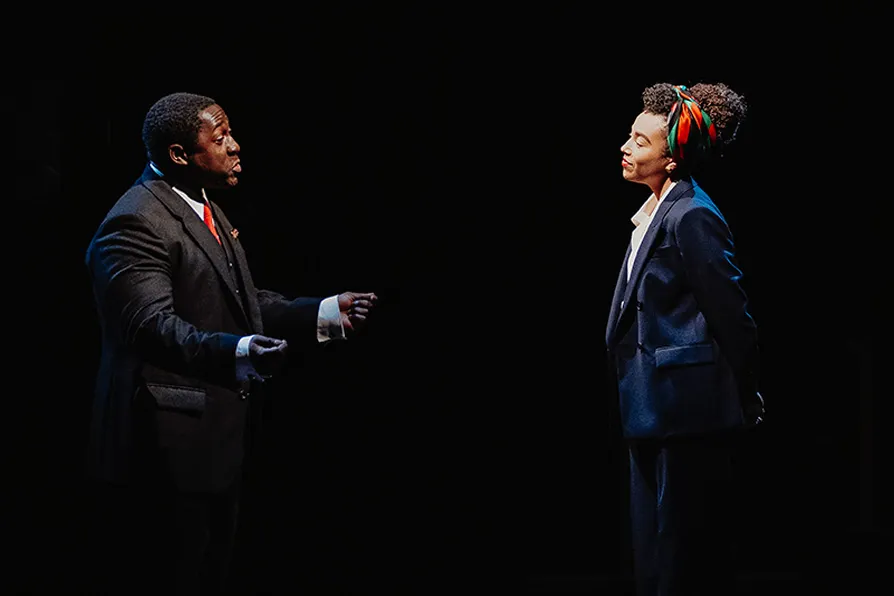SUE TURNER is fascinated by a book that researches who the largely immigrant workforce were that built the Empire State
PAUL FOLEY welcomes a dramatic account of the men and women involved in the pivotal moment of the 5th Pan African Congress

 INSPIRING: Eric Kofi Abrefa (Kwame Nkrumah) and Leonie Elliott (Alma la Badie) in liberation [Pic: Isha Shah Photography]
INSPIRING: Eric Kofi Abrefa (Kwame Nkrumah) and Leonie Elliott (Alma la Badie) in liberation [Pic: Isha Shah Photography]
Liberation
Royal Exchange Manchester
★★★★
ON the back of the defeat of fascism in 1945, African nations began to organise for the fight for independence.
In October of that year the 5th Pan-African Congress was held at Chorlton-on-Medlock town hall, Manchester, (now part of Manchester Metropolitan University). Organised by Jamaican activist George Padmore, over 200 political activists, civil rights campaigners and scholars assembled from across Africa and the Caribbean to organise for change. Among those present were Jomo Kenyatta, Kwame Nkrumah, Amy Ashwood-Garvey, Alma La Badie and the American anti-racist WEB Du Bois. Len Johnson was an observer from the Communist Party.
In a declaration to “Colonial workers, farmers and intellectuals” the delegates called for peace, independence and self-determination.
Celebrating this monumental event, playwright Ntombizodwa Nyoni has written Liberation which is receiving its world premiere as part of Manchester’s biennial International Festival.
This is not just a play about a pivotal moment in the international fight for Pan-African liberation, it is a play about people, relationships and change.
Nyoni focuses on the impact of the fight for freedom and equality on the individuals involved. The sacrifices they and their families endure, how as a community of activists they create alliances and the inevitable tensions that arise from differences in strategic approach.
Central to the play is the role of women. Too often, Nyoni says, women’s role in the struggle is forgotten or airbrushed from history.
Amy Ashwood-Garvey was a major anti-racist activist but was still referred to as Marcus Garvey’s wife. Alma La Badie, a Liverpool-based social worker and campaigner for black women’s liberation, has all but been forgotten. While the men bicker over whose name should be on the final manifesto, it is women such as Dorothy Pizer and Betty Dorman who keep the whole show on the road.
Monique Toukko’s fine direction takes these themes and moulds them into a hugely interesting, thoughtful and enjoyable production. This is helped by an excellent ensemble cast, who effortlessly transform these complex characters into real people, full of passion, stubbornness, fears and mega egos.
Pamela Nomvete is outstanding as Garvey, straight-talking no nonsense woman full of charm and charisma. Leonie Elliot is wonderful as Alma representing a younger generation of women activists frustrated at the pomposity of some of the men in leadership.
A simple stage design by Paul Wills allows the action to move seamlessly between the congress floor, smaller back rooms and various Manchester pubs and clubs, and against the background of the action there is a marvellously evocative original score by Ife Ogunjobi.
This is a fitting tribute to an important moment in black history. Eighty years on how much has changed? Most African and Caribbean countries have achieved independence but the colonial legacy lingers, while the oppressive claw of imperialism still pulls a lot of strings.
And there is still much to do to recognise the role of women in the fight for liberation.
Runs until July 26. Box office: 0161 833 9833, royalexchange.co.uk

On the 121st anniversary of communist Claudia Jones’s birth ROGER McKENZIE looks at political events that shaped her, and those she helped shape

DAVID HORSLEY reminds us of the roots and staying power of one of the most iconic festivals around












